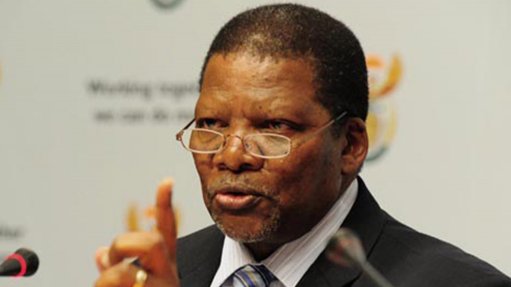
Water and Sanitation Minister Gugile Nkwinti
The Department of Water and Sanitation (DWS) is working to “achieve more with less”, with Water and Sanitation Minister Gugile Nkwinti having presented a R15.57-billion budget for 2018/19 on Tuesday.
Historical commitments not adequately budgeted for, budgetary constraints influenced by challenges emanating from previous financial years and preliminary contract commitments are expected to cut into the budget for the year, he said.
“In certain instances, contracts without value have been entered into, thus posing difficulty in accurate budgeting,” he told media during a pre-budget vote briefing.
He cited the bucket eradication programme that experienced unauthorised expenditure through overspending, which will still reflect in the finalised DWS financials for 2017/18.
About R292-million in overspending was reported in the sanitation programme in 2016/17, and additional overspending will be reported for the 2017/18 financial year.
However, further issues can be overcome through proper project management, the Minister believes.
There are also crucial projects, such as the War on Leaks programme, which have not been budgeted for by the department.
Further, preliminary commitments for which contracts have been signed and service providers are currently rendering services amount to R7.5-billion, R2-billion of which is expected to be paid in the current financial year.
“Poor project management within the department has created a situation where service providers are accelerating the work at a much faster pace than what the department had budgeted for,” he added.
“We have had to reprioritise some of our major infrastructure projects, with a particular emphasis on the Giyani water project, raising the Clanwilliam dam wall, as well as the critical Mzimvubu water project.”
The Giyani project was initially planned – and budgeted for accordingly – for completion over a period of five years; however, the project was accelerated and completed within a 2.5-year period, revealing poor alignment between the budget and the project milestones.
“Urgent intervention is required in our project management, as well as contract management, to ensure that the project planning is aligned with the available budget and to prevent our projects from being ahead of the available budget,” Nkwinti said.
He also highlighted a preliminary R1.8-billion in accruals from the previous financial year, which could not be paid in the previous year owing to insufficient funds.
“This will have a carry through effect in the current year, as it will require the current year’s budget to be used to pay the accruals instead of using it for the activities as outlined in our Annual Performance Plan,” Nkwinti said.
Meanwhile, of the 2018/19 budget, R5.4-billion is for direct transfers to municipalities under schedule 5B for the water services infrastructure grant, as well as the regional bulk infrastructure grant.
“This inflates the budget figures for the department, as these are essentially grants meant for fully functional municipalities that can dispense of such funding on their own. This is notwithstanding whether the said municipalities are capable of spending the funds or not.
“The department has a peculiar budgeting challenge wherein budget constraints exist under schedule 6B where we have allocated only R3.5-billion, yet where we have allocated more money (R5.4-billion) under schedule 5B, the municipalities are unable to spend the money,” he added, noting a mismatch in the allocation of funds between schedule 5B and schedule 6B of the Division of Revenue Act.
Despite the challenges, the department must continue to deliver on its mandate, with the latest budget based on a five-pillar turnaround strategy, aspects of which can only take effect in the next medium-term strategic framework period from 2019 to 2024.
The five pillars comprise a national water resources and services authority, a national water resources and services regulator, a water resources and services value chain, a water resources and services master plan, and an institutional rationalisation and organisational alignment.
“To give effect to these pillars, we have streamlined the organogram of the department,” Nkwinti said, adding that other interventions included the establishment of a National Water Resources and Services Advisory Council, with emphasis on planning, finance, design, construction and maintenance and the engagement of National Treasury and the Department of Cooperative Governance and Traditional Affairs to address the perennial problem of billions of rands of municipal grant funds that are either unspent or irregularly spent, for which the DWS must account.
The DWS also aims to reduce its construction costs by in-sourcing some of the projects to the department’s construction unit, which is currently being reviewed for the delegation of powers, activation and rebuilding to form a State-controlled construction company.
The DWS is also working to identify all open-ended deals and contracts with a view to approaching a Court of Law to have them declared null and void in order to arrest the uncontrolled growth of accruals.